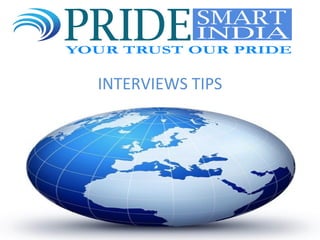
WHAT IS INTERVIEW
- 2. INTERVIEWS
- 3. WHAT IS INTERVIEW? A formal meeting in which one or more persons question, consult, or evaluate another person.
- 4. Reasons for face interviews Interviews are a useful method to: investigate issues in an in depth way investigate the use, effectiveness and usefulness of particular library collections and services discover how individuals think and feel about a topic and why they hold certain opinions inform decision making, strategic planning and resource allocation etc.
- 5. Advantages of interviews They allow more detailed questions to be asked They usually achieve a high response rate Ambiguities can be clarified and incomplete answers followed up Interviewees are not influenced by others in the group Respondents' own words are recorded Some interviewees may be less self-conscious in a one-to-one situation.
- 6. Interviews Types Screening Interview Screening interviews are used to ensure that the candidates meet minimum requirements.
- 7. How To Appear? Highlight your qualifications and accomplishments using non-technical language - the HR professional is not necessarily an expert in your field. Answer questions clearly and succinctly - personality is not as important at this stage of the process. If asked about salary expectations, use a range – make sure you’ve done your homework in this area. If conducted by phone, have your resume beside you to refer to for dates and names.
- 8. Telephone Interview Telephone interviews are often used to screen candidates and is a good way to minimize travel expenses! They can be challenging because you aren’t able to rely on nonverbal communication or body language.
- 9. How To Appear? Have your resume, organization information, points that you want to highlight, and list of questions you may want to ask in front of you - and have a short list of your accomplishments prepared to discuss. Have a pen and paper handy to keep notes or write down any questions that come up; keep a glass of water beside you. Speak slowly, enunciate clearly, and vary your voice tone, tempo, and pitch to keep the interviewers attention. Provide short answers that make interchange easier on the phone; do not interrupt the interviewer. Smile – even on the phone it will project a positive image.
- 10. Video Conferencing Video conferencing is typically used to conduct interviews using video technology from a distance. The same interview strategies you would use if you were meeting in person apply - clothing, body language, and dialogue are important.
- 11. How To Prepare? Make eye contact with the camera, which, to the employer, appears as direct “eye contact.” Check the monitor periodically to observe the interviewer’s body language.
- 12. One-on-One Interview The most common interview format is the one-on-one (or face-to-face). This interview is traditionally conducted by a direct supervisor and if often the last step in a series of interviews. The interview may be directive following a clear agenda, or non-directive relying on you to lead the discussion as you answer open-ended questions.
- 13. How To Prepare? It is important to be thoroughly prepared – know the job and know yourself.
- 14. Panel Interview A panel interview is conducted by two or more interviewers. One member of the panel may ask all of the questions or individual panel member may take turns.
- 15. How To Prepare? • Make eye contact with the person asking the questions, but also to give every member on the panel your attention, regardless of if they ask any questions at all – treat them all with equal importance. • Be prepared to extend more energy in this setting, as you need to be alert and responding to more people
- 16. Group Interview A group interview occurs when several candidates for a position are interviewed simultaneously. Group interviews offer employers a sense of your leadership potential and style, and how you would fit into the team
